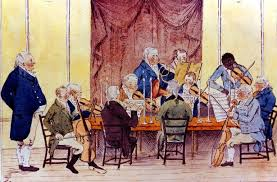In this week in 1835 the man who was possibly one of the most talented Cornwall-based classical music composers of all time passed away and was buried in Kenwyn churchyard, to be forgotten about for many years. But Joseph Antonio Emidy was no native to Cornwall. Instead, he had been born in Guinea in west Africa at some time between 1770 and 1775.
As a child Emidy was sold to Portuguese slavers who, after baptising and converting their captives to Christianity, sold them on to a slave master in Brazil. By the later 1780s Emidy had been moved to Lisbon in Portugal. There, his master recognised his precocious musical talents and paid for a violin and music lessons. In the more racially relaxed atmosphere of Portugal Emidy flourished and by his 20s he had gained an established place as a violinist with the prestigious Lisbon Opera.
A promising musical career in Lisbon was cut short by the brutal interruption of the British navy. Sir Edward Pellew was the Cornish captain of HMS Indefatigable and hero of the naval squadron that was harrying French vessels up and down the Channel and Western Approaches. Pellew had put in at Lisbon and attended a concert of the opera. Lacking a fiddler to play the jigs and reels to which his sailors would dance in their time off, Pellew pressed, effectively kidnapped, the young musician.
Emidy then spent five years as a fiddler on Pellew’s ship. In that time he must have witnessed ferocious sea battles and endured howling gales. His views of his situation are perhaps hinted at by the fact Pellew did not allow him ashore, no doubt fearing he would run away. Emidy had exchanged a theoretical but comfortable slavery in Lisbon for a practical slavery as a ‘free man’ in the Royal Navy. Eventually, Pellew moved on to another command and in 1799 Emidy was discharged at Falmouth, where he took up residence.
In Cornwall he made his living from teaching the violin and guitar, while playing in the concerts of local amateur harmonic societies. His prowess as a very skilled musician rapidly became apparent. Not only did he play but also compose, the first of his compositions being noted in 1802. Unfortunately however, none of his work has survived.

In the same year of 1802 Joseph married local girl Jenefer Hutchins. The next decade was spent teaching and performing to support his young family. Six children were born, of whom five survived into adulthood. At some point around 1812 the family moved from Falmouth, where the harmonic society was fading fast, to Truro, where he became leader of the Truro Philharmonic Society.
While at Falmouth, Emidy’s patron, James Silk Buckingham, had taken examples of his compositions to London. There they were ‘highly approved’ by a meeting of professional musicians. However, the consensus was that ‘his colour would be so much against him, that there would be a great risk of failure’. The narrow attitudes towards racial difference that prevailed in London scuppered Joseph Emidy’s chance to achieve fame on a wider stage. Nonetheless, his background hadn’t hindered his acceptance or the ‘high reputation’ he enjoyed in Cornwall.
What an incredibly fascinating and wonderful story. Would love some sources for this. This is amazing, and I’d always be glad to see more articles about black people in Cornwall.
What a life this chap had. How sad none of his music has survived.
LikeLike
What an amazing story. There are so many social and historic threads illustrated in one man’s life- his outstanding musical talent obviously but also slavery, religion, racial prejudice, an inter racial marriage in 1802, naval and maritime history, the operation of pressgangs and late 18th century European warfare to name but a few. What a survivor.
LikeLike
Also, I must add, what a world and well-travelled man, taking his experiences into a Cornwall and a people that could not have even the beginnings of a comprehension of his life. There’s something very sad about it all. And how often must he have thought of his family in Africa. Impossible to ever see them again. His life must have had deep threads of sorrow running through it.
Presumably his children added to the genetic stock of Cornishness.
LikeLike
I have been studying my family tree for several years,but i must say that when i discovered that Joseph Emidy was my 3 times great grandfather i couldn,t wait to tell all my friends and family.
Charles Oxley (son of Rhoda Buzza)
LikeLike
I’m also related to Joseph Emidy, I’m not sure what relation he is to me but I know he is
LikeLike
I am also related to Joseph Emidy
LikeLike
I am related to him through his son Thomas. Thomas’ family ended up in Woonsocket RI. I just visited his grave in Truro. I find his story amazing. I have a relative of my grandfathers who had researched his life extensively. Her works were submitted to the Smithsonian so his story wouldn’t be lost.
LikeLike
My family ‘Kirk’ are also related and there are family in the USA.
LikeLike